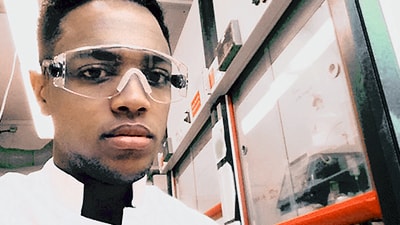Environmental Science
From the neighborhoods of Kingston, Jamaica, to the labs of Carnegie Mellon University, to the halls of Christiana Albertina University of Kiel, Germany: Adam Simpson's passion for clean water action has been many years in the making.
 "I grew up in Jamaica in a family of engineers who own and run Jamaica Wells and Services Ltd.," the chemical engineering senior said. "My experience bringing water to some of Jamaica's poorest areas, where piped water had only just been installed, gave me the desire to follow a career path that will benefit Jamaican society."
"I grew up in Jamaica in a family of engineers who own and run Jamaica Wells and Services Ltd.," the chemical engineering senior said. "My experience bringing water to some of Jamaica's poorest areas, where piped water had only just been installed, gave me the desire to follow a career path that will benefit Jamaican society."
Simpson's main concern lies in the soil. Due to agricultural runoff and improper waste disposal, nitrate levels in Jamaica's soil have become dangerously elevated. Humans exposed to nitrate pollution can experience respiratory and neurological damage, and even death.
His solution to this problem? The development of a sustainable, low-cost denitrifying process to remove the nitrates from wetland systems, some of the main areas negatively impacted by these pollutants.
That goal led Simpson to Carnegie Mellon, where in 2014, he enrolled in Organic Chemistry II, taught by associate professor of chemistry Danith Ly. Excited by Ly's development of gammaPNA, a synthetic molecule with wide-reaching applications in diagnosing and treating genetic diseases, Simpson spent the next three semesters working in Ly's lab.
Although an unlikely match to outsiders, to Simpson, studying protein folding in these synthetic molecules has obvious application to his goals.
"Although I may not be directly isolating enzymes to understand their areas of activity, the work is very related," Simpson said. "Denitrification is a process performed by mechanisms inside the bacteria in the ground using various enzymes; and these enzymes are proteins. To be active in the denitrifying process, these proteins must exhibit folding."
By looking at the work in Ly's lab from a different angle, Simpson saw the experience as a part of his larger goal. The same impulse landed him an internship at one of Germany's most prestigious universities.
Through the German Academic Exchange Service's Research Internships in Science and Engineering program (DAAD RISE), Simpson participated in groundbreaking protein engineering research with the Frank Sönnichsen group at the Christiana Albertina University of Kiel.
"DAAD RISE provides a great opportunity for undergraduate students to build their research profile by gaining experience in a different lab and research context," said Joanna Dickert, assistant director of Undergraduate Research and National Fellowships at Carnegie Mellon. "Students are able to supplement their research skills while gaining valuable international experience."
Dickert and the rest of the team at the Fellowships and Scholarships Office assist students in applying to this program and others like it every year. This year, three Carnegie Mellon students received a DAAD RISE fellowship: Adam Simpson, and Engineering sophomores Julia Wang and Nadia Florman. In addition, History Department doctoral student Alissa Bellotti received a DAAD Graduate Study Scholarship to support her dissertation research.
The work that Simpson performed with the Frank Sönnichsen group involved making alterations to protein amino acid sequences to stabilize protein-folding structures, which could one day be used to create an antimicrobial drug.
Simpson said the most rewarding part of his experience in Germany was not the subject of the research, but the techniques he learned during the process that he can apply in the future.
"In addition to NMR analytical techniques, I was also taught (LC/MS) or HPLC-MS mass spectroscopy, a powerful purification technique used in the sciences, by Ph.D. student Matthias Lipfert," Simpson said. "For the work we were doing, we could use this technique to determine if the protein synthesis went as planned. In my own water research, however, I can use these techniques to determine the success of my denitrificatrion wetland unit process."
Simpson's flexibility in his methods have led him down the unexpected paths to achieving his goals. His ability to find mentors and lessons in unlikely places have given him the tools to make his dream of a sustainable, low-cost denitrifying process a reality.
"Adam is a natural leader," Ly said. "He is very creative, determined, and hardworking. If I were to have a son, I would want him to be just like Adam."
And thanks to Simpson's creativity, determination, and hard work, the wetlands of Jamaica will one day be cleaner — and its people safer — than they ever could have been without him.
Related: